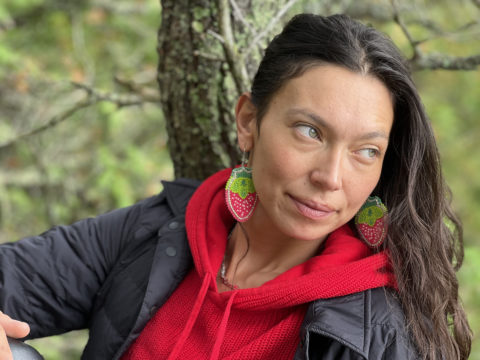Sarain Fox on the Power of Storytelling and the Best iPhone Camera Yet
We chatted with the creator about the stunning visuals she captured on latest iPhone 13 cameras.
Visual storytelling is a powerful tool — and thankfully, it’s no longer just for the pros. Apple’s upcoming iPhone releases — iPhone 13, iPhone 13 mini, iPhone 13 Pro and iPhone 13 Pro Max — are designed to make creating epic visuals that much easier. The new lineup is available September 24, and includes the brand’s biggest camera advancements ever. Sarain Fox, an Anishinaabekwe activist, filmmaker and content creator from Batchewana First Nation, was one of the first people in Canada to test the new iPhones. Fox tells FASHION about the inspiration behind the stunning visuals she captured, some tips on how to use the new iPhone cameras, and the power of storytelling.
Capturing the beauty of Indigenous womanhood
Fox recently headed back to Batchewana First Nation on the rugged shores of Lake Superior to visit her mother and aunt. She was inspired to create visuals about Mother Earth and Indigenous womanhood, she says. “My whole vibe with the content I wanted to share with you was around matriarchs… that’s my entire focus. I’m obsessed with finding ways to share our stories as Indigenous women.”
In the past, Fox has focused on telling stories of her auntie Mary Bell — her family’s eldest matriarch and a residential school survivor. More recently, Fox has been inspired by her strong relationship with nature instilled in her by her mother. “I’ve been really focusing on how my mom has raised me to love the land, to see stories in the land, and to see the beauty of humanity and how we connect. So as a storytelling content creator, that’s what I’m trying to capture.” With sharp imagery of the water, greenery and trees, Fox completed the video essay below by reciting an excerpt from Cree artist Buffy Sainte-Marie’s song, “Carry It On.”
Cinematic mode makes everyone a filmmaker
To make her subjects stand out, Fox used the iPhone camera’s cinematic mode — a feature of all four new iPhones that instantly elevates your videography game. Based on studies of cinematography and the use of rack focus in films, Apple’s cinematic mode records videos of subjects — like people, animals and objects — with a depth-of-field effect. It holds focus on a subject while blurring the background, even when they’re moving. When a subject gazes away or leaves the frame, the camera shifts focus to the next subject that it detects. “It’s like portrait mode for video,” says Fox.
Fox says shooting with cinematic mode was “terrifying at first,” because it felt like she was stuck with a certain focus. But there are so many ways to alter cinematic mode, even after filming. “You think that you’re locked into this really beautiful look — which sometimes can be almost too gorgeous — but then you realize you’re actually shooting with all the options,” she explains. Cinematic mode works automatically, but can also be controlled manually. After shooting, users can change the focus and edit the blur level to tell the story in a different way.

Macro photography and video bring even the smallest details to life
Overall, the image quality on the new iPhones are significant. The iPhone 13 and iPhone 13 mini come with the biggest sensor ever in an iPhone dual-camera system — capable of gathering 47 percent more light for brighter pictures. The iPhone 13 Pro and iPhone 13 Pro Max also have ultra-wide cameras with autofocus that bring macro photography to the iPhone for the first time ever. Macro captures sharp images and enlarges intricate details. It also works with video, including slow-mo and time-lapse.
In the past, Fox says trying to zoom into an object wouldn’t be worth it, because the image would become too grainy and lose all its detail and quality. “Having the potential to just get in there [with a macro lens]… you can actually get the beautiful tiny little details that we see that make magic.”

Trust yourself — but don’t skip the tutorials
As a beginner, the best way to create compelling visual content is by following what inspires you, says Fox. “No one was an expert when they started anything. I think we’ve gotten obsessed with the tech, and we’ve sort of lost the beauty of the not-so-perfect things,” she explains. “Even when we’re beading moccasins, we’ll often leave one the wrong colour on purpose. Nothing is perfect, and that’s that honouring of that.” Remember that even the latest and greatest camera is just a tool. “The only way to get good at it is to go and shoot what you want to. Take the tool, and let it follow your lead.”
To familiarize yourself with the shooting options, do yourself a favour and follow the tutorials. “Don’t skip any of that. Your phone will literally tell you all of the ways that it can do things for you and help you,” says Fox. The new iPhones have options to personalize the camera with “photographic styles,” where users can choose from four default styles to customize the tone and warmth to their liking. Fox encourages users to tap into the personalization features to make the most of their content.

It all comes down to the power of visual storytelling
Storytelling, for Fox, is about reclaiming the narrative. “Especially for me as a brown woman, when I am holding a camera… I have the ability to tell a story. I’m reclaiming all of the times that someone has spoken for me, for us,” she says. “And so, storytelling for me is powerful and potent. When we have the ability to tell our own stories… we’re able to share our truth.”
This month is also an important time for Indigenous representation in media and storytelling, says Fox. On September 30, Canada will mark National Day for Truth and Reconciliation a federal statutory holiday for the first time, to help ensure that the tragic history and ongoing legacy of residential schools is never forgotten. “I think what’s most important to me is that this month we’ll be inundated with content from Indigenous content creators, storytellers, politicians — from every single corner, we’re seeing Indigenous content,” she says. Storytelling and oral history are part of Indigenous cultures, and seeing these stories come to life is empowering for Sarain Fox. “The content that’s coming from us talks about vibrancy, resiliency and the truth of who we are as a surviving, thriving community. If you look around at what’s coming out right now, you can see that there’s just so much beautiful storytelling happening across what I say is Indian Country.”






